Related Research Articles
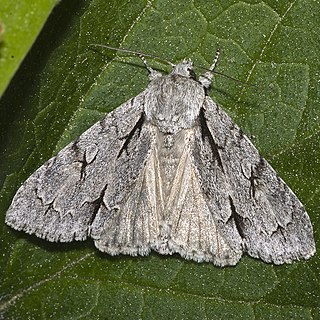
Acronicta is a genus of noctuid moths containing about 150 species distributed mainly in the temperate Holarctic, with some in adjacent subtropical regions. The genus was erected by Carl Linnaeus in his 1758 10th edition of Systema Naturae. Caterpillars of most Acronicta species are unmistakable, with brightly colored hairy spikes, and often feed quite visibly on common foliate trees. The hairy spikes may contain poison, which cause itchy, painful, swollen rash in humans on contact. The larva of the smeared dagger moth is unusually hairy even for this genus. Acronicta species are generally known as dagger moths, as most have one or more black dagger-shaped markings on their forewing uppersides. But some species have a conspicuous dark ring marking instead.

Hypena is a genus of moths in the family Erebidae. It was first described by Franz von Paula Schrank in 1802. These non-migratory moths overwinter as pupae and almost never estivate as adults.

Carathis is a genus of moths in the family Erebidae. The genus was described by Augustus Radcliffe Grote in 1866.
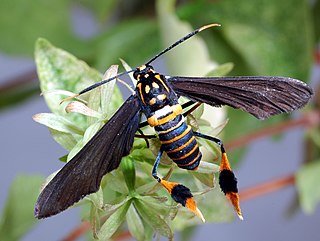
Horama is a genus of tiger moths in the family Erebidae first described by Jacob Hübner in 1819.
Pareuchaetes is a genus of moths in the family Erebidae. The genus was erected by Augustus Radcliffe Grote in 1866.
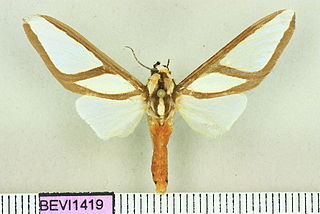
Robinsonia is a genus of moths in the family Erebidae. The genus was erected by Augustus Radcliffe Grote in 1866.

Virbia is a genus of tiger moths in the family Erebidae. The genus was erected by Francis Walker in 1854.

Gabara is a genus of moths in the family Erebidae. The genus was erected by Francis Walker in 1866.
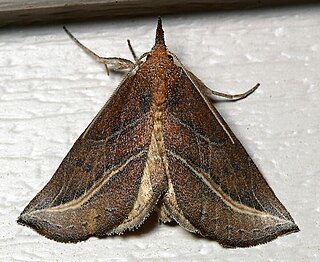
Phyprosopus is a genus of moths of the family Erebidae. The genus was erected by Augustus Radcliffe Grote in 1872.

Heliomata is a genus of moths in the family Geometridae.

Datana is a genus of moths of the family Notodontidae. The genus was erected by Francis Walker in 1855.
Burtia rubella is a moth in the subfamily Arctiinae first described by Augustus Radcliffe Grote in 1866. It is found on Cuba.
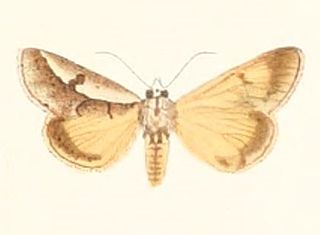
Euscirrhopterus poeyi, the pullback moth, is a moth of the family Noctuidae. The species was first described by Augustus Radcliffe Grote in 1866. It is found from southern Florida and Mexico, through Central America to Brazil. It is also found in the Caribbean, including Cuba.
Horama pennipes is a moth in the subfamily Arctiinae first described by Augustus Radcliffe Grote in 1866. It is found on Cuba.
Horama diffissa is a moth in the family Erebidae first described by Augustus Radcliffe Grote in 1866. It is found in Cuba and Haiti.
Virbia disparilis is a moth in the family Erebidae. It was described by Augustus Radcliffe Grote in 1866. It is found on Cuba.
Virbia heros is a moth in the family Erebidae. It was described by Augustus Radcliffe Grote in 1866. It is found on Cuba.
Virbia latus is a moth in the family Erebidae. It was described by Augustus Radcliffe Grote in 1866. It is found on Cuba.
Prionoxystus piger, the baccharis carpenterworm moth, is a moth in the family Cossidae. It was described by Augustus Radcliffe Grote in 1865. It is found in Florida and Cuba.

Cecrita is a genus of prominent moths in the family Notodontidae. There are about eight described species in Cecrita, found in North, Central, and South America.
References
- ↑ Savela, Markku (August 9, 2015). "Burtia Grote, 1866". Lepidoptera and Some Other Life Forms. Retrieved November 2, 2019.
- Pitkin, Brian & Jenkins, Paul. "Search results Family: Arctiidae". Butterflies and Moths of the World. Natural History Museum, London.